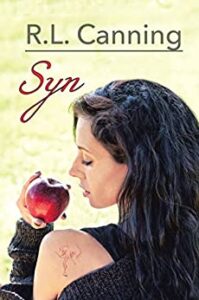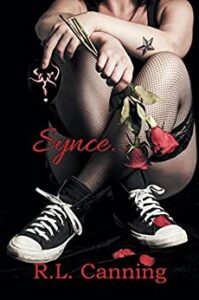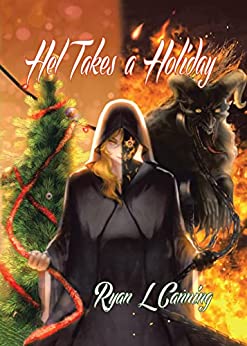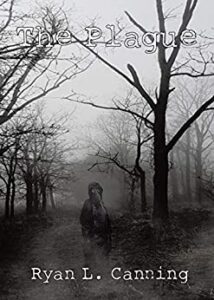Hel Takes a Holiday received a 4+ star review, making it an IndieReader Approved title.
Following find an interview with author Ryan L. Canning.
What is the name of the book, and when was it published?
Hel Takes a Holiday, published on June 21st, 2022, by Tellwell Talent.
What’s the book’s first line?
The first snowfall of the year blanketed the town, that perfect evening separating the magic of Halloween and the horrors of Christmas.
What’s the book about? Give us the “pitch.”
The Queen of Helheim is not the type of immortal being that one should mess with – fierce, unforgiving, and fatally clever. However, when it comes to deciding who gets punished, who gets presents, and who is offered a chance at redemption, there are some ground rules. For generations, a pact has been honoured between the legions of demons at Hel’s command, the powerful magic of the North Pole, and the big jolly man himself.
The Naughty and Nice lists are, therefore, sacred things, as they determine which souls are bound for torture and which ones are destined for treats on Christmas morning. When Hel discovers that someone is tampering with the lists and robbing her realm of doomed souls, she puts Santa on her own naughty list and sends a spy to infiltrate his Village and get to the bottom of the mystery.
The dark queen is far from alone in her vengeful efforts: La Calavera Catrina, better known as Death, is not only Hel’s beloved companion but also her deadly right-hand captain; there is also her son Krampus, the monstrous child-snatcher of nightmares, and the demonic horde he commands. Navigating the complex games of petty gods, including her trickster father, Loki, while simultaneously trying to unravel the North Pole’s scheme before all-out war,
When Hel’s spy, Servant Parris, infiltrates Santa’s Village, they quickly discover that all is not what it seems at the North Pole. Santa appears to be hiding something, but Parris also finds that there is goodness in the Village, too, along with the generosity and kindness, particularly from Dasher, who takes her under his….hoof. The spy’s covert investigation and narrow escapes reveal that an even darker power is in control of Santa’s Nice List tampering, but the identity of the ultimate villain remains unknown.
Tensions rise as Christmas nears, and Hel plans the most gruesome and terrifying Krampusnacht in centuries as payback for Santa’s deception. Krampus is tasked with snatching naughty children and terrifying countless others, even those that Santa’s false list had tried to protect. Not one for half-measures, Hel presses her advantage and plans to take back Christmas entirely, ending the reign of candy canes and elf-made toys. However, as the holiday battles rage and the painful losses mount on both sides, the true enemy is revealed – a shocking twist that readers won’t see coming.
What inspired you to write the book? A particular person? An event?
I have been a fan of the legend of Krampus for some time. I have read stories and watched movies about Krampus from different regions of the world, but none explained from where he came. Once I found out he is the son of the Goddess Hel, I thought it would be an excellent opportunity to tell her story while trying to bring the legend of Krampus to the North American audience.
What’s the main reason someone should really read this book?
Hel Takes a Holiday is a fun book that blends fantasy with mythology. I tried to include a diverse cast of characters from Norse and Greek mythology, Mexican folklore, and modern fables. I believe the readers will enjoy the story, action, and levity in the pages.
What’s the most distinctive thing about the main character? Who-real or fictional-would you say the character reminds you of?
When Hel is in her element, she is a fierce, courageous woman, a true master of her domain. Still, when she is at her family home, she is no longer the feared ruler of the underworld but a daughter and sibling that has to endure the frustrations of a mischievous father, a domineering mother, and a petty rivalry with her brother. While writing the character of Hel, I thought of Lagethra from the TV show “Vikings” and how she would handle the same situations.
When did you first decide to become an author?
I come from an artistic family. I struggled for years to find my creative outlet. I tried to learn several instruments, painting, different crafts, and costume design. In my early 20s, I started traveling for work, so I wrote letters to friends to keep in touch. They encouraged me to keep writing. Because of their encouragement, I wrote a few short stories. When I had enough short stories, I arranged them into a book. That’s when I knew I had found the creative talent I knew was lurking inside me somewhere.

No, the first book I wrote was an erotic romance called “Syn” under the Pseudonym R.L. Canning. I have also written a sequel, “Synce,” and a thriller released in 2019 called “The Plague.”
What do you do for work when you’re not writing?
I am a civilian contractor for an airborne surveillance company in the Caribbean.
What’s the best and the hardest part of being an indie?
The best part of being an indie writer is that there are no deadlines, and you maintain creative control of your work. The hardest part for me is self-promotion. I see other indie authors who can promote their work and hype their social media sites beautifully. I am horrible at it.

Don’t fret if you’re not great with grammar or don’t have an extensive vocabulary. Write the story you want to write. Let the editor help you polish it later. My first drafts are usually a barely coherent word salad, but I get the story down.
Would you go traditional if a publisher came calling? If so, why?
Yes, I definitely would. If a traditional publisher were to invest in my work, I assume they’d also help guide me through the marketing and promotion process. Plus, I think there is still an unfair stigma regarding indie authors.
Is there something in particular that motivates you (fame? fortune?)
I’d be lying if I said I didn’t dream about becoming a known author, being recognized on the streets, and making enough money that I can help the lives of others, but that’s the fantasy part of the process. I enjoy creating my own stories, worlds, and characters. Just as reading can take you out of reality to live many different, exciting lives, writing those stories does the same for me. The biggest perk to writing versus reading is that I’m never disappointed in the ending.
Which book do you wish you could have written?
The Phantom by Susan Kay.


